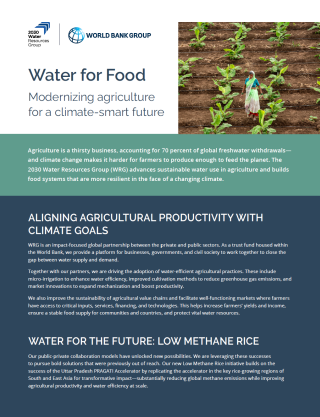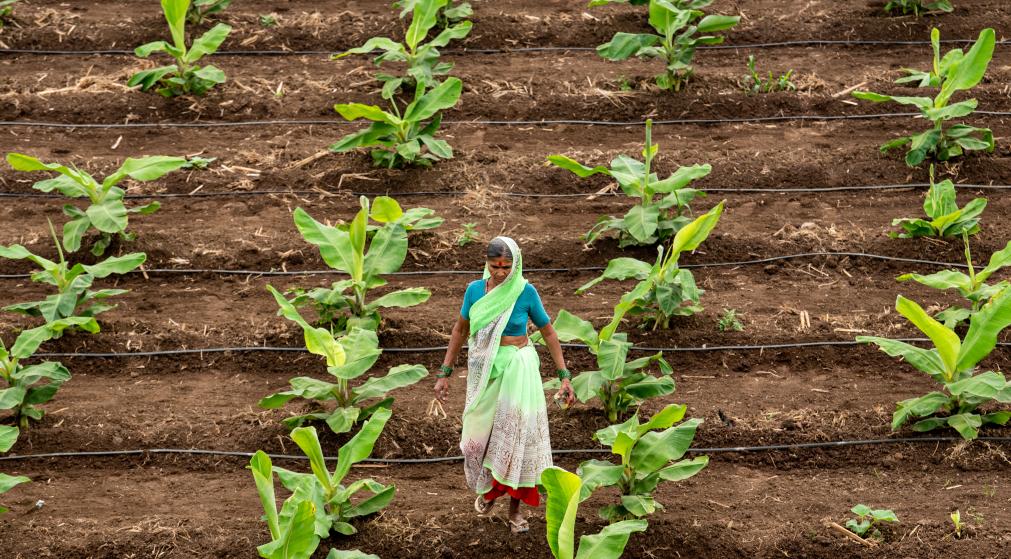
Water for Food
We're advancing sustainable water use in agriculture and building food systems that are more resilient in the face of a changing climate.
Modernizing Agriculture for a Climate-Smart Future
Aligning agricultural productivity with climate goals
Together with our partners, we are driving the adoption of water-efficient agricultural practices. These include micro-irrigation to enhance water efficiency, improved cultivation methods to reduce greenhouse gas emissions, and market innovations to expand mechanization and boost productivity.
At the same time, we’re improving the sustainability of agricultural value chains and facilitating well-functioning markets where farmers have access to critical inputs, services, financing, and technologies. This helps increase farmers' yields and income, ensure a stable food supply for communities and countries, and protect vital water resources.
70%
of global freshwater withdrawals are linked to agriculture,
making efficient water use critical for achieving food security, especially in water-scarce regions.
24%
of global greenhouse gas emissions come from agriculture
with improved water management offering significant opportunities to reduce emissions and mitigate the impacts of climate change.
80%
of the food in Asia and sub-Saharan Africa is produced by smallholder farmers,
underscoring the need for sustainable water management to support their productivity and livelihood.
25%
The decrease in crop yields expected in some regions by 2050 due to climate change,
making climate-smart agricultural practices essential for food security.
Current Engagements
We focus on initiatives with the potential to scale and support projects from the ground up by addressing critical needs at every stage—from initial planning to financing to full implementation. We work closely with private sector, governments, and farmers to develop and implement these solutions, ensuring they are both effective and scalable. Through our partnership with the World Bank, we help access the resources needed to expand these initiatives.
Explore Our Ongoing Initiatives In Agriculture:
India
Scaling Climate-Smart Rice Cultivation
In Uttar Pradesh, where cultivation of wheat, rice, and sugarcane by small farmers dominates, WRG is helping change farming practices to save water and improve yields. Agriculture in the state uses two to three times more water per ton of food produced than the global average and is one of the largest sources of greenhouse gas emissions. The Uttar Pradesh Program for Agriculture Transformation and Increased Incomes (UP PRAGATI) Accelerator is developing greener value chains that reduce carbon and water footprints, while boosting productivity and incomes.
The Accelerator aims to reach 1 million smallholder farmers over five years. The targets include a fivefold increase in micro-irrigation, a 60% reduction in greenhouse gas emissions, and a tenfold expansion in direct seeded rice. This approach involves sowing rice seeds directly into the field instead of transplanting seedlings. It reduces water use by 18-35% and cuts labor costs, while also lowering methane emissions. This method also shortens planting time, enhances productivity, and reduces crop stubble burning, which contributes significantly to air pollution. Early results are promising. Micro-irrigation adoption has reduced costs by 30-40% and halved delivery times, demonstrating the effectiveness of the approach.
A digital micro-irrigation platform has also been developed to reduce the cost and risk for farmers adopting water-efficient irrigation through standardized pricing and quality assurance. A separate digital platform will streamline farm equipment rentals, aggregate supply and demand, expand credit access, and support capacity-building initiatives, particularly for women.
The accelerator was developed by the Uttar Pradesh Multi-Stakeholder Partnership, which is chaired by the Cabinet Secretary, the senior-most bureaucrat in the state, supported by 26 private sector partners, and facilitated by WRG. It was approved by the state’s Cabinet in 2022. The program is being implemented through the Uttar Pradesh Diversified Agriculture Support Project (UP-DASP), an autonomous special purpose vehicle under the Agricultural Production Commissioner’s office and a Technical Support Unit of independent experts supported by financing from the Bill and Melinda Gates Foundation, Coca-Cola Foundation and GIZ India. The special purpose vehicle provides a single-window platform for last-mile services to farmers, enhancing both demand and supply of agricultural services while leveraging private sector contributions.
The model has attracted significant financial backing, including $350 million through the World Bank’s Uttar Pradesh Agriculture Growth and Rural Enterprise Ecosystem Strengthening Project (UP AGREES), which supports scaling up innovations developed under the UP PRAGATI Accelerator. WRG is also collaborating with the World Bank’s Climate Warehouse to integrate voluntary carbon markets and scale the initiative globally. The accelerator is also the foundation for WRG’s Scaling Low-Methane Rice initiative, positioning Uttar Pradesh as a leader in scalable, climate-smart agriculture practices.
Bangladesh
Boosting Agricultural Productivity with Water Efficient Technologies
In the water-scarce Barind Tract of Bangladesh, WRG is working with farmers to implement the Introducing Water-Efficient Technologies (IWET) project. Launched in 2018 in partnership with The Coca-Cola Foundation, the project supports water-efficient and sustainable production of rice and fruits (mango, orange/citrus fruits, and other high value crops). It aims to reduce groundwater abstractions while also lowering carbon emissions and boosting agricultural productivity.
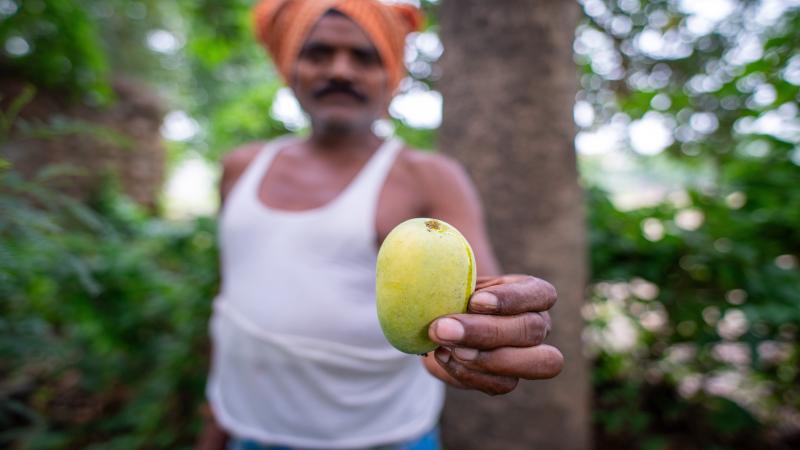
The project promotes alternate wetting and drying irrigation in rice cultivation, which reduces water usage compared to traditional methods and cuts down methane emissions from flooded rice fields, a major source of greenhouse gases in rice farming. Additionally, the project supports ultra-high density orchard farming using drip irrigation, further reducing water consumption and associated carbon emissions.
Central to the project is the establishment of a network of 60 farmer hubs, which provide essential support across the agricultural value chain. These hubs are not only key in delivering advanced irrigation technologies like drip irrigation and practices such as alternate wetting and drying, but also play a crucial role in connecting farmers with suppliers and markets, thereby enhancing their market access and profitability. Over the past five years, the project has resulted in around 7.271 million cubic meters of irrigation savings. It has also trained 19,500 farmers and provided services to 63,362 Farmer Hub customers, directly improving the livelihoods of farmers and their communities. (An estimated additional 58,500 beneficiaries are linked to farmer households.)
The project’s impact is felt in both agricultural and economic terms. Rice production has increased by about 400 kilograms per hectare, and almost 2,600 hectares of land have been brought under improved irrigation practices. The introduction of ultra-high density mango orchards has led to a 200-fold increase in productivity compared to traditional methods, with local farmers replicating these innovations with their own resources. The farmer hubs have facilitated the sale of 120 tons of mango in the national market and expanded into exports, with 11 tons of mango sold internationally in 2023.
We are exploring opportunities to scale the IWET project’s successes. This includes implementation of a new initiative replicating the project, called the Climate-Resilient Agricultural Advancement in Barind. On its sixth year, the IWET project is getting mainstreamed under the Ministry of Agriculture, followed by the creation of a regional multi-stakeholder platform. These efforts aim to continue driving sustainable agricultural practices, ensuring that many more farmers can thrive while protecting vital water resources.
Ethiopia
Advancing Farmer-Led Irrigation
WRG is exploring the potential to expand farmer-led irrigation development - a participatory approach where farmers take the lead in designing, implementing, and managing irrigation systems to improve water access and agricultural productivity - aimed at boosting productivity, profitability, and climate resilience among small-scale farmers in Ethiopia. We are building relationships with the Ethiopian Ministry of Agriculture, the Ministry of Water and Energy, NGOs, and the private sector, with a view to supporting the Ethiopian government’s priorities in achieving food security and resilience through farmer-led irrigation.
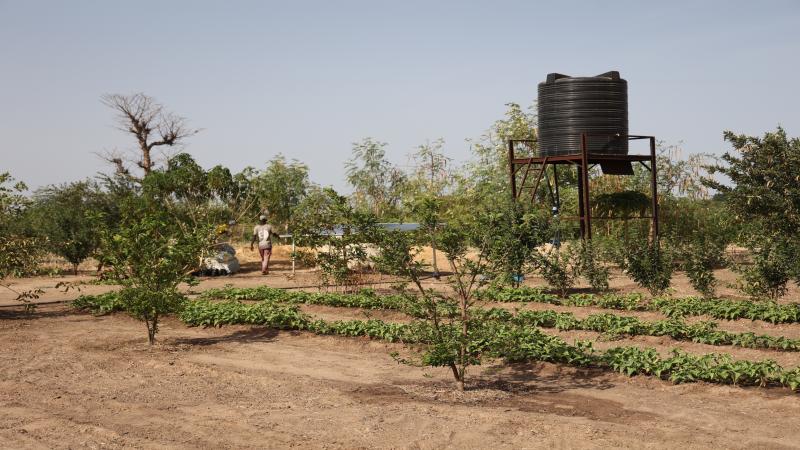
During 2022, we partnered with the International Water Management Institute and the Ethiopian Ministry of Agriculture to organize two multi-stakeholder dialogues focused on farmer-led irrigation. These dialogues, part of a broader series, have been instrumental in documenting experiences and learnings that will inform the scaling of farmer-led irrigation initiatives. Key themes included financing solutions, value chain development, market systems approaches, and the role of buyers in driving small-scale irrigation investments.
Ethiopia is currently implementing the Food Systems Resilience Program for Eastern and Southern Africa with financing from the World Bank and support from WRG. Drawing on its experience championing farmer-led irrigation in Sub-Saharan Africa, particularly in Kenya and Rwanda, we are helping secure private sector financing, and facilitate farmers' access to technology, finance, and markets.
The next steps involve designing and implementing a farmer-led irrigation development program for Ethiopia. Insights from the multi-stakeholder dialogues will play a crucial role in shaping these plans, which will be aligned with the broader goals of the Ethiopian government and the World Bank’s program activities.
Water for the Future: The Next Generation of WRG Innovation
Our public-private collaboration models have unlocked new possibilities. We're leveraging these successes to pursue bold solutions that were previously out of reach.
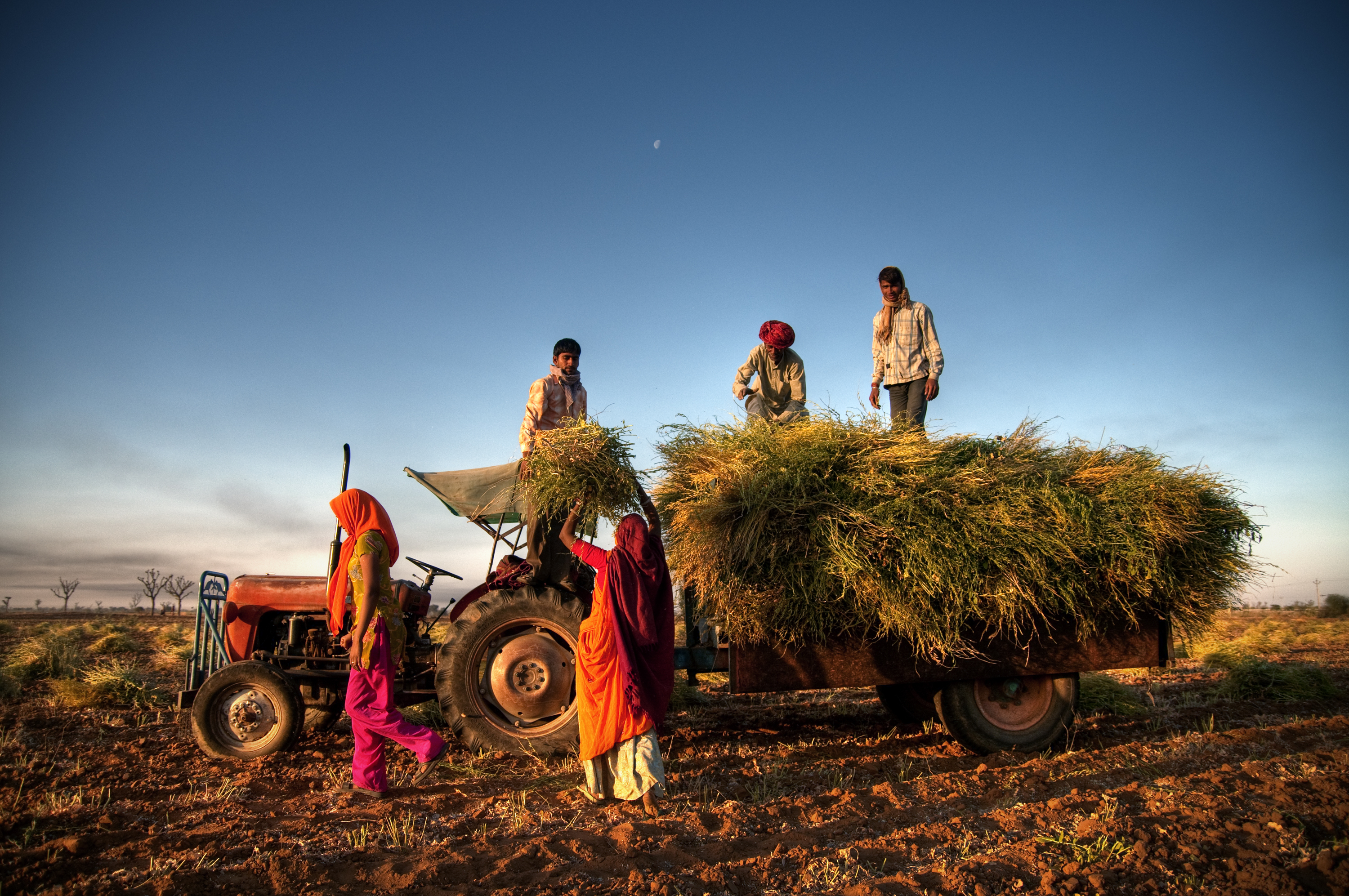
Low Methane Rice: Cultivating Climate Solutions
We are expanding climate-smart approaches to cut greenhouse gasses and increase yields.
Rice cultivation consumes 20% of the world’s freshwater and generates 12% of global methane emissions. With over 40% of the world’s population relying on rice, improving cultivation methods is essential to increase water efficiency, boost productivity, and reduce emissions.
The Low Methane Rice Initiative builds on the success of the Uttar Pradesh PRAGATI Accelerator, aiming to expand this model across South and East Asia, where rice farming significantly contributes to methane emissions. India, China, and Indonesia together account for nearly half of global methane emissions from rice cultivation. Replicating this accelerator in these key regions could have a transformative impact—substantially reducing global methane emissions while improving agricultural productivity and water efficiency at scale.
UP PRAGATI promotes methods like direct seeding and alternate wetting and drying, which can reduce methane emissions by up to 65%. Although these techniques are not new, adoption has been slow due to the need for attributes such as level fields, proper drainage, and reliable irrigation to be implemented simultaneously. Farmers also require access to specialized seeds, fertilizers, and pesticides. For cultivation changes to succeed, they must also align with farmers' income-driven priorities, likely necessitating incentives. A multifaceted approach—including price incentives and improved market functionality—is essential.
By creating incentives and aligning sustainable practices with farmers' priorities, the Low Methane Rice Initiative unlocks the potential of proven approaches to reduce emissions and enhance productivity. Through private sector involvement, the program strengthens both the supply and demand for agricultural services, while leveraging carbon credits to provide financial incentives that deliver both economic and environmental benefits to farmers.
Turning Carbon into Cash: How Farmers Benefit from Climate-Smart Practices
The Low-Methane Rice initiative helps farmers adopt sustainable practices that generate carbon credits, which can be traded on voluntary carbon markets for additional income. By linking climate-smart farming with carbon trading, farmers gain a financial incentive to reduce their environmental impact. This not only makes it easier for them to transition to sustainable agriculture but also reduces risks for private sector investors, encouraging investment in climate-smart technologies. These efforts integrate farmers into more sustainable value chains, boosting their profitability while contributing to broader climate goals.
Past Innovations, Lasting Impact
A Legacy of Firsts in Irrigation
Over the past decade, we have developed and implemented solutions that were the first-of-their-kind, empowering farmers in Africa and Asia to enhance productivity while using water more efficiently. Our efforts include pioneering large-scale community drip irrigation projects, creating new financing models for smallholder farmers to access modern irrigation systems, and developing automated systems to manage and conserve water resources in agriculture. These initiatives have proven successful, offering clear examples that can be replicated and adopted in other regions.
Explore some of our past breakthroughs:
India
The World’s First and Largest Community Drip Irrigation Project at Ramthal, Karnataka
In Karnataka's Bagalkot District, where water scarcity once dictated farmers' lives, the Ramthal Drip Irrigation Project, conceptualized by WRG, has become one of the region’s most significant agricultural milestones. Spanning 24,000 hectares and benefiting 15,000 farmers, the initiative has doubled the area of irrigated land while reducing water abstraction by 24 million cubic meters—reshaping the agricultural landscape.
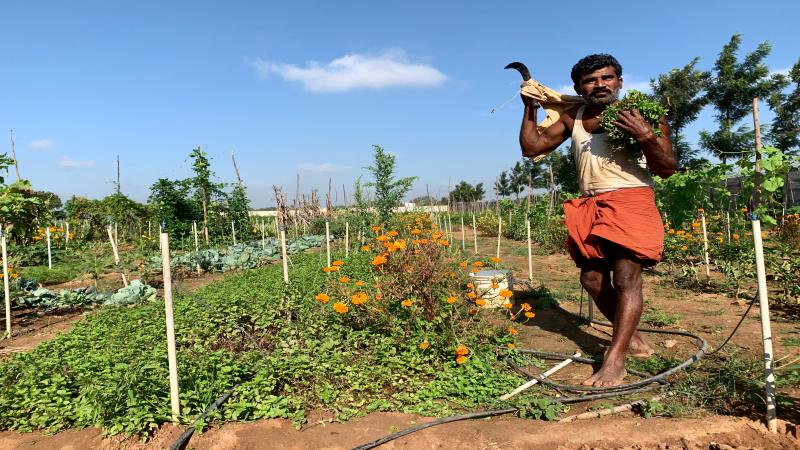
To address the challenges farmers faced in accessing water, the Government of Karnataka sought WRG’s support to conceptualize a model for private sector participation in the irrigation sector. The resultant model represents one of the world’s largest fully automated drip irrigation systems, at a total cost of US$130 million, with private sector involvement for design, construction, and operation of the system.
To ensure the project’s sustainability, WRG developed a hybrid annuity model that incentivizes the private irrigation companies to operate and maintain the system for five years post-construction. Under this performance-based payment structure, the private sector mobilizes 100% of the investment upfront, with up to 70% paid by the end of construction and the remaining 30% reimbursed over five years, based on operational performance.
Infrastructure alone, however, isn’t enough. The project connects farmers to market opportunities, providing access to buyers, farm inputs, financing, and technical expertise to grow high-value crops. Buyers benefit from a steady supply of high-quality agricultural products.
Building on this success, the Karnataka government has replicated the model across an additional 100,000 hectares. The Ramthal project serves as the cornerstone of the world’s largest Drip-to-Market Agro-Corridor (DMAC), a program uniting public, private, and community efforts to enhance productivity and profitability for farmers. With WRG’s facilitation, nearly $650 million in financing was secured to expand the approach across the state, with a project management unit led by local experts continuing the work. By promoting water-use efficiency and sustainable agricultural practices, the program has established a replicable framework for market-driven solutions.
Kenya
Unlocking Irrigation Access for Smallholder Farmers
In 2016, WRG, in collaboration with the International Finance Corporation (IFC), launched the East Africa Irrigation Financing Facility to address the challenges smallholder farmers in Kenya face in accessing modern irrigation systems. This first-of-its-kind initiative introduced a private-sector financing model, partnering with financial institutions and using structured purchase agreements along with a first-loss guarantee.
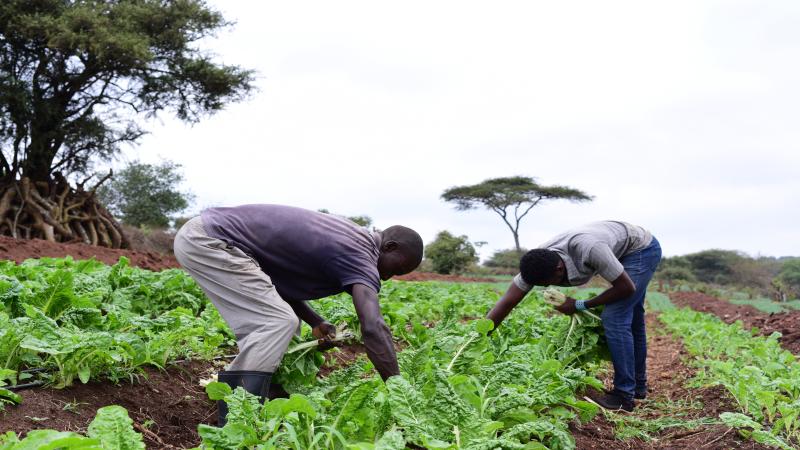
The model brought together stakeholders from across the value chain—particularly banks, equipment providers, smallholder farmers, and buyers—to increase investments in efficient irrigation. With a first-loss guarantee in place, financial institutions provided loans to ‘buyers’—such as traders, aggregators, or exporters within the agricultural value chain—to purchase irrigation technology on behalf of farmers. The irrigation technology provider then supplied the equipment and offered technical assistance to the farmers. In return, the buyer repaid the loan based on increased yields, deducting an equivalent amount from payments owed to farmers for their produce.
Targeting around 500 smallholder farmers, the project improved water-use efficiency and productivity for those who often lacked resources to invest in modern solutions. Though modest in scale, the project had significant impacts, providing dedicated financing and support that allowed smallholder farmers to adopt irrigation systems successfully. Insights from this pilot have contributed to the broader development of farmer-led irrigation development, an approach that empowers farmers to manage their own irrigation with support from financial institutions and technology providers. This model offers a pathway to more resilient and sustainable agriculture, especially in the face of climate change and economic shocks like COVID-19.
South Africa
Transforming Irrigation with Automated Water Management
WRG supported the establishment and scale-up of South Africa’s first automated water administration system. The system manages the usage, distribution and financial accounts for six major irrigation systems. The introduction of the system has led to substantial water savings—reducing water distribution losses by up to 20%, which amounts to an estimated 154 million cubic meters of water saved per year. These savings contribute to narrowing the water demand-supply gap in South Africa by around 3%.
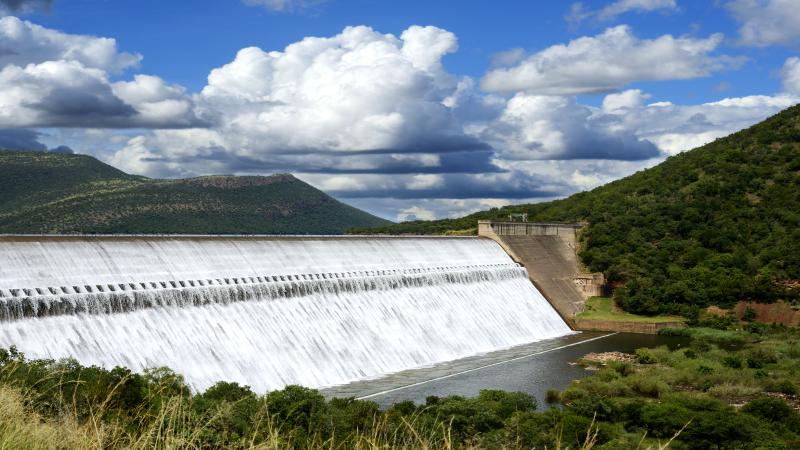
Through our collaboration with the Strategic Water Partners Network (SWPN)—a multi-stakeholder platform co-founded by WRG—this system has been expanded across 21 major irrigation schemes, covering more than 190,000 hectares and benefiting over 10,000 farmers. The system integrates water ordering, release management, and financial accounting into a single, comprehensive system, ensuring precise water delivery while accounting for seepage and evaporation. This has improved the management of irrigation schemes, reduced human error, and significantly enhanced water-use efficiency, making it a critical tool for sustaining agricultural productivity in water-scarce regions.
Building on this success, we secured additional funding from the World Bank and GIZ to further enhance the system, including the development of a smartphone app that allows farmers to order water directly from their homes, increasing both accessibility and efficiency. The system continues to support agricultural productivity while strengthening the sector's resilience in the face of climate change and increasing water scarcity.
India
Driving Agricultural Water Efficiency Through PPPs
In Maharashtra, India, where agriculture is a key sector facing challenges from water scarcity and inefficient irrigation, WRG facilitated a series of public-private partnerships (PPPs) to support integrated agricultural development. This approach addresses multiple aspects of farming—combining efficient water use, infrastructure improvements, modern farming practices, and enhanced market access—to create sustainable growth and improve farmer livelihoods. These partnerships laid the foundation for a WRG-conceived project aimed at improving water use efficiency, boosting productivity, and enhancing the well-being of farming communities.
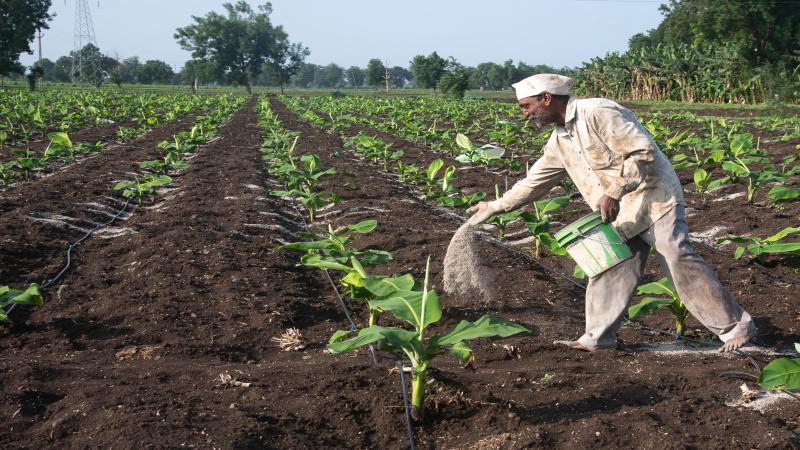
This marked the first project in Maharashtra where commitments were secured from the public sector, private sector, and civil society to work towards a shared goal of improving agricultural water efficiency. Each partner played a vital role: the state’s Water Resources Department took charge of project oversight and improving bulk water supplies to farms; farmers, organized into water user associations, invested in efficient water technologies; and private-sector partners focused on capacity building and strengthening market access.
Access to the right technology is crucial for enhancing both productivity and water use. To support this, 26 custom hiring centers were established, offering affordable equipment rentals, such as mulchers, ploughs, and sprinkler systems, along with accessible credit options. Additionally, 332 farm field schools were launched, providing over 13,000 farmers with training in water-efficient agricultural practices.
Spanning 98,000 hectares across six districts, the project achieved a 19% improvement in water-use efficiency for sugarcane and 8% for onions, reducing freshwater usage by 152 million cubic meters. The project continues under the guidance of a project implementation unit established by the Water Resources Department of Maharashtra, which coordinates stakeholders, monitors progress, and addresses emerging challenges.
